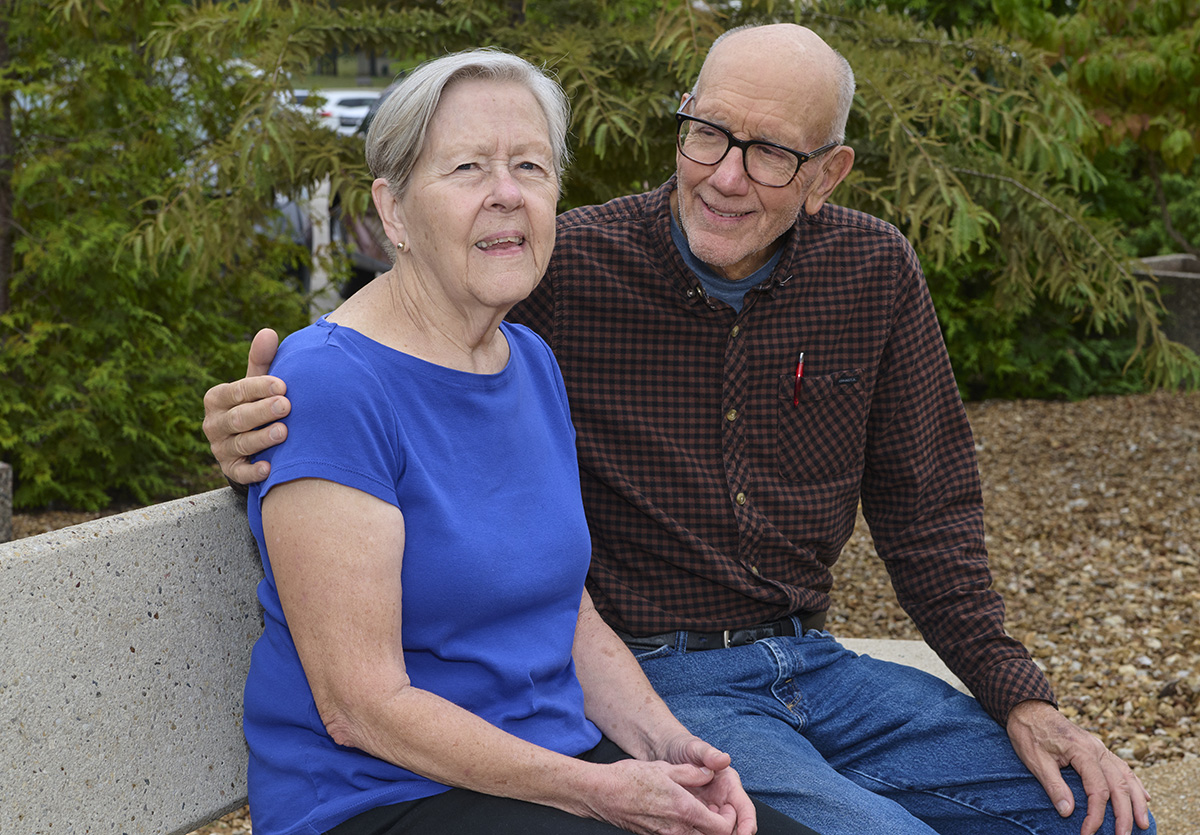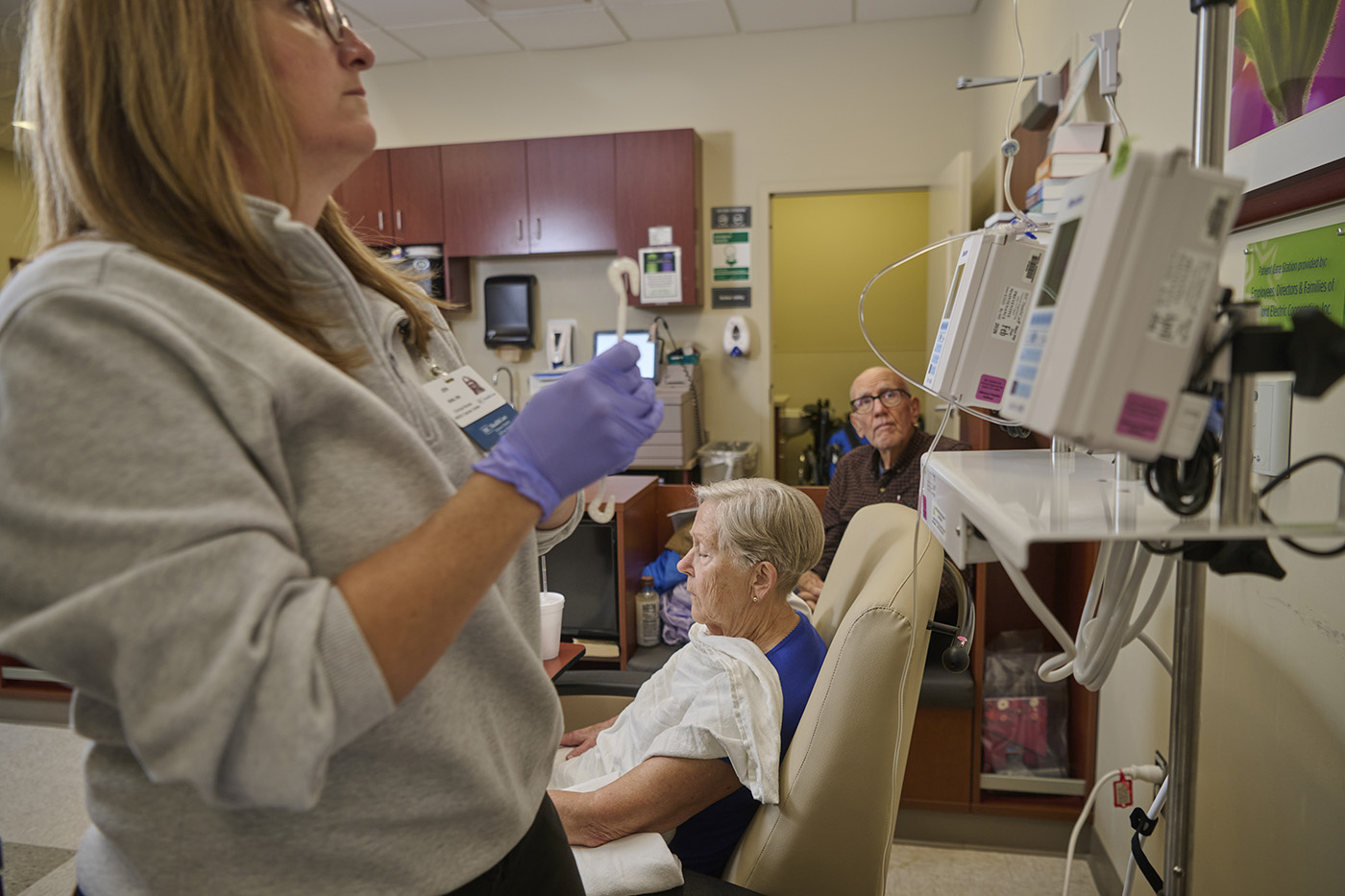Nicole Needed an Innovative Alzheimer's Treatment. Missouri Baptist Sullivan Hospital Made It Easier for Her to Access.
Together with academic medicine partner WashU Medicine, the hospital is bringing advanced treatments closer to home for some patients

On a recent Wednesday morning, Nicole Bodey sat with a smile beneath a warm blanket in the Cancer and Infusion Center at Missouri Baptist Sullivan Hospital. Her husband of 57 years, Bud Bodey, sat by her side, as he always does after driving Nicole from their Springfield, Missouri, home to the hospital for her newly approved innovative infusion treatment for early stage Alzheimer’s disease.
Bud and Nicole’s two-hour drive that morning went smoothly and provided uninterrupted time to talk. The Cancer and Infusion Center staff and volunteers made sure they had enough drinks and snacks. As Nicole’s 30-minute treatment neared its completion, the two started brainstorming lunch options, discussing which local spot they should try this time before heading home.
The running joke between Nicole, 79, and Bud, 81, is that these visits to Missouri Baptist Sullivan have turned into something close to a date—one with a bigger purpose.
Thanks to the teamwork of WashU Medicine memory care experts at Barnes-Jewish Hospital as well as the team at Missouri Baptist Sullivan, both part of BJC HealthCare, Nicole became the first patient at Missouri Baptist Sullivan to receive Kisunla™ (donanemab), an FDA-approved infusion treatment for early stage Alzheimer’s disease. Nicole’s treatment being available at Missouri Baptist Sullivan means the couple shaves about three hours off what would have been regular round-trip drives between Springfield and St. Louis.
A diagnosis and a decision
One of Nicole’s daughters, a nurse practitioner, first noticed Nicole’s signs of cognitive trouble about two years ago. Testing confirmed a diagnosis of mild Alzheimer’s disease, an irreversible and progressive brain disorder that is the most common cause of dementia in older people. Fortunately for Nicole, she got an early start in her pursuit of treatment.
“If you have concerns about memory, bring it to the attention of your primary care doctor,” says Nupur Ghoshal, MD, the WashU Medicine neurologist at Barnes-Jewish Hospital who oversees Nicole’s care. “There are opportunities during your annual wellness visit to talk about cognitive issues. Your primary care doctor can order lab testing or imaging if necessary. With Nicole, her early symptoms were subtle. It was noticed when she was playing cards.”
There was no question about how Nicole and Bud would move forward after the diagnosis. They would do that together, like they have countless times during their marriage, whether it was moving across states, raising their three children, or working alongside each other in the insurance business they started and operated until retirement.
 There was, however, a question about how Nicole wanted to approach treatment. She didn’t hesitate before deciding she wanted to try the newest options available.
There was, however, a question about how Nicole wanted to approach treatment. She didn’t hesitate before deciding she wanted to try the newest options available.
“The way I see it is, maybe it helps me,” Nicole says. “And maybe it will help somebody else in the future. That would be a real plus.”
Through the recommendation of a Springfield-area Alzheimer’s disease support group, Bud and Nicole sought out Dr. Ghoshal and Alexandra Venuto, AGPCNP-BC, a WashU Medicine board-certified nurse practitioner in the medical school’s Memory Diagnostic Center and Alzheimer’s Disease Immunotherapy Clinic. They provide virtual consultations and regular MyChart patient portal correspondence with Bud and Nicole in between the couple’s occasional trips to St. Louis to meet in person.
After a series of tests provided specific details about Nicole’s brain, Dr. Ghoshal recommended Kisunla. As a monoclonal antibody, Kisunla targets and helps clear beta-amyloid plaques from the brain, which are believed to drive the onset of Alzheimer’s disease and contribute to its complications, such as memory loss. Kisunla and another recently approved anti-amyloid drug, Leqembi® (lecanemab), represent a significant step forward, because unlike previous drugs that could only treat the mild symptoms of Alzheimer’s disease, the new drugs are the first to successfully slow the disease’s progression.
WashU Medicine has been active in clinical trials of both anti-amyloid drugs as it continues to pursue expanded treatment options for Alzheimer’s disease. In a 2025 study, WashU Medicine researchers calculated that the anti-amyloid drugs could help patients with very mild symptoms of Alzheimer’s live independently and care for themselves for eight to 10 months longer than if they had not been treated with the drugs.
Nicole was optimistic and excited to start treatment. There was just one potential hurdle. The drug wasn’t available in Springfield.
A quicker trip
One benefit of Nicole’s treatment plan is that it requires less frequent transfusions—only one per month—compared with Leqembi, which is given every two weeks. That wasn’t the only news that made things easier. She was informed Kisunla is available at Missouri Baptist Sullivan, a closer option than traveling to Barnes-Jewish Hospital in St. Louis for both her infusion treatments and the regular MRIs that allow her care team to check for side effects.
The closer-to-home option didn’t just save gas money and car maintenance. It added ease.
“We were so happy to hear that,” Bud says.
“We said yes right away,” Nicole says. “It works really well.”
Lisa Lochner, president of Missouri Baptist Sullivan Hospital, calls this “a great example of what’s possible when we work together across BJC HealthCare and WashU Medicine.”
“By collaborating across the system,” she adds, “we’re able to deliver innovative treatments such as Kisunla right here in Sullivan, improving patients’ lives and expanding hope.”
Encouraging results
Nicole’s treatment is in progress, but encouraging signs are already obvious.
More than six months into her monthly infusions, test results showed her cognition held steady, which is significant considering the progressive nature of Alzheimer’s disease.
She’s still able to work out at the YMCA four times a week. She drives her car on familiar routes close to home, cooks meals for her family, keeps up with her kids and five grandchildren, and rarely passes up a chance to tease her husband about his tendency to worry more than she does.
She offers this advice for others who find themselves facing a diagnosis of Alzheimer’s disease: “Don’t be afraid of something you don’t know,” she says. “I’d rather try something than not do anything, because it might be better than what we had before.”
Missouri Baptist Sullivan Hospital is part of BJC HealthCare, connecting our community to exceptional care, technology, and WashU Medicine expertise across the region. Discover how we care for you.
Recent News
Patient Story
Beating the Odds: A Pastor’s Journey Through Advanced, Lifesaving Heart Care
Patient Story
Healing Beyond the Surface
Patient Story
Before Life-Changing Spine Surgery at Christian Hospital, a Grandfathe
Patient Story
Chenitra Emergency Care
Patient Story
Christian Hospital Hybrid Room Procedures Save Lives
Patient Story